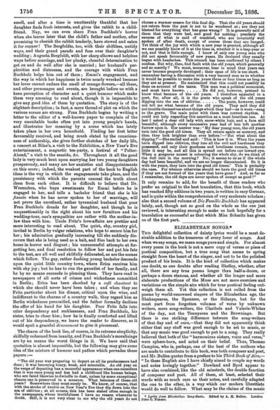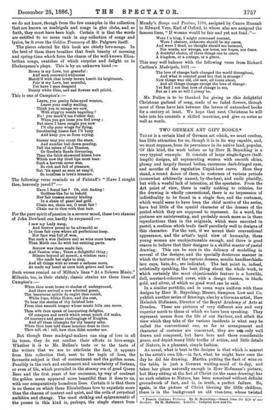ELIZABETHAN SONGS.* Tim delightful collection of dainty lyrics would be
a most de- sirable addition to the treasures of every lover of songs. And when we say songs, we mean songs pare and simple. For almost every poem in the book is not a mere copy of verses or piece of poetical composition, but a true song that seems to spring straight from the heart of the singer, and not to be the polished product of his brain. It is the kind of collection which makes one donbt, as one doubts after reading Shelley, whether, after all, there are any true poems longer than half-a-dozen, or perhaps a dozen stanzas, and whether all the longer and more elaborate productions of the Muse are not mere exercises and variations on the simple airs which for true poetical feeling out- weigh them all. Yet this collection is not culled from the poems by world-renowned singers of the Elizabethan age, the Shakespeares, the Spensers, or the Sidneys, but for the most part from forgotten volumes of verse by unknown writers, mere song-writers, the Claribels and Valerie-Whites of the day, not the Tennysons and the Brownings. But there is one striking difference between the song-writers of that day and of ours,—that they did not apparently think either that any stuff was good enough to be set to music, or that any music was good enough to put to a song. They really believed that both of the "harmonious sisters, voice and verse," were sphere-born, and acted on their belief. Thus, Thomas Campion, who is, perhaps, one of the best of the authors who are made to contribute to this book, was both composer and poet, and Mr. Millen quotes from a preface to his Third Book of Aire,— " In these English airs I have chiefly aimed to couple my words and notes lovingly together." Dowland and Byrd appear to have also combined, like the old minstrels, the double function of composer and poet. All of them, at least, selected their words with as much care as their notes, and carefully adapted the one to the other, in a way which our modern librettists would do well to follow. What may be the claims of the music
• Lyrics from Elizabethan Song-Books. Edited by A. H. Batten. London John C. Nimmo. we do not know, though from the few examples in the collection that are known as madrigals and songs in glee clubs, and so forth, they must have been high. Certain it is that the words are entitled to no mean rank in any collection of songs and lyrics, be it even the Golden Treasury of Mr. Palgrave itself.
The pieces selected for this book are chiefly love-songs. In the best of them there breathes that fresh beauty of morning and spring-time which form the charm of the well-known Eliza- bethan songs, snatches of which surprise and delight us in Shakespeare's plays. This is by an unknown hand :—
Brown is my Love, but graceful :
And each renowned whiteness Match'd with that lovely brown loseth its brightness.
Fair is my Love, but scornful, Yet have I seen despised Dainty white lilies, and sad flowers well prized.
This is one of Campion's :-
Leave, you pretty false-eyed wanton,
Leave your crafty smiling, Think you to escape me now, With slipp'ry words beguiling ? No! you mock'd me t'other day, When you got loose you fled away ; But since I have caught you now
I'll clip your wings for flying, Smothering kisses fast I'll heap
And keep you so from crying.
Sooner may you count the stars, And number hail down-pouring, Tell the osiers of the Thames, Or Goodwin Sands devouring, Than the thick-showered kisses here Whioh now thy tired lips must bear. Such a harvest never was,
So rich and fall of pleasure, But 'tis spent as soon as reap'd, So trustless is love's treasure.
The following verse reminds us of Falstaff's "Have I caught thee, heavenly jewel ?" :—
Have I found her ? Oh, rich finding !
Goddess-like for to behold Her fair tresses seemly binding In a chain of pearl and gold. Chain me, chain me, 0 most fair ! Chain me to thee with that hair.
For the pure spirit of passion in a severer mood, these two stanzas of John Dowland can hardly be surpassed :—
I saw my Lady weep,
And Sorrow proud to be advanced so In those fair eyes where all perfections keep. Her face was full of woe, But such a woe (believe me) as wins more hearts Than Mirth can do with her enticing parts.
Sorrow was there made fair,
And Passion wise; Tears a delightful thing ; Silence beyond all speech, a wisdom rare; She made her sighs to sing,
And all things with so sweet a sadness move,
As made my heart at once both grieve and love.
Such verses remind us of Milton's lines "At a Solemn Music." Ifiltonic, too, in their stately, classic strains are these lines of Campion's :-
When thou must home to shades of underground,
And there arrived a new admired guest, The beauteous spirits do engirt thee round, White lope, blithe Helen, and the rest, To hear the stories of thy finished love From that smooth tongue whose music hills can move.
Then wilt thou speak of banqueting delights, Of masques and revels which sweet youth did make, Of tourneys and great challengings of Knights, And all these triumphs for thy beauty sake.
When thou bast told these honours done to thee, Then tell, oh ! tell, how thou didst murder me.
But though these madrigal-makers can sing of love in all its tones, they do not confine their efforts to love-songs. Whether it is to Mr. Bullen's taste or to the taste of the writers that we are to attribute the fact, it appears from this collection that, next to the topic of love, the favourite subject is that of contentment and the golden mean. Possibly in the rush and excitement and uncertainty of fortune, or even of life, which prevailed in the stormy era of good Queen Bess and the first years of her successor, by way of contrast the golden mean appeared more beautiful than it does to us, with our comparatively humdrum lives. Certain it is that there is no theme on which these Elizabethans love to expatiate more than the charms of content and quiet, and the evils of perpetual ambition and change. The most striking and epigrammatic of the poems in this kind is, perhaps, the single stanza from
Mundy's Songs and Psalms, 1594, assigned by Canon Hannah to Edward Vera, Earl of Oxford, to whom also are assigned the famous lines, "If woman would be fair and yet not fond :"- Were I a king, I might command content,
Were I obscure, unknown should be my cares, And were I dead, no thought should me torment, Nor words, nor wrongs, nor loves, nor hopes, nor fears.
A doubtful choice, of three things one to crave,
A kingdom, or a cottage, or a grave.
This may well balance with the following verse from Richard Carlton's Madrigals, 1601 :— The love of change bath changed the world throughout,
And what is counted good but that is strange ? New things wax old, old new, all turns about, And all things change except the love of change: Yet find I not that love of change in me, But as I am so will I alway be.
Mr. B alien is to be thanked for giving us this delightful Christmas garland of song, made of no faded flowers, though most of them have lain between the leaves of untouched books for a century at least. We hope that next Christmas he will take into his counsels a skilled musician, and give us notes as well as words.



































 Previous page
Previous page